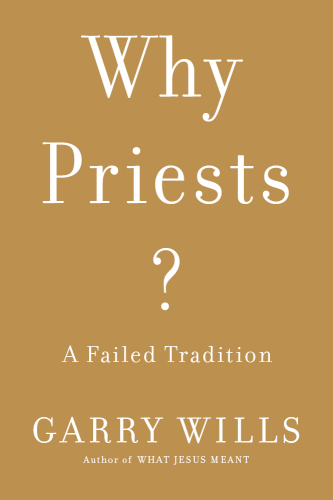
Why Priests?
The Real Meaning of the Eucharist
کتاب های مرتبط
- اطلاعات
- نقد و بررسی
- دیدگاه کاربران
نقد و بررسی

January 14, 2013
Do we really need Catholic priests? Wills, Pulitzer Prize winner and author of Why I Am a Catholic, dares to pose this controversial question during a time when vocations have declined drastically, leaving some Catholics without access to the sacraments. The author draws upon robust biblical scholarship, especially when focusing on the New Testament letter from Paul to the Hebrews, the book used to justify the creation of the priesthood. The goal of this project is not to bash priests—the author counts many priests as friends and even dedicates the book to the late Jesuit cardinal and theologian Henri de Lubac. But his thorough research elucidates the priesthood’s specious origins and reminds Christians that the Church did just fine without priests in its early years, and could again. Unfortunately, the author’s work may not influence many, given the multiple roles the priesthood now fills for the faithful. Catholic priests are more than sacramental machines; they also counsel, help heal relationships, and act as spiritual guides. Still, one cannot help but be impressed with this brilliant work written by a scholar whose love for the Church compels him to make it better.

Starred review from January 15, 2013
Pulitzer Prize winner Wills (Verdi's Shakespeare, 2011, etc.), a venerable voice on church history, thought and practice, provides a stunning critique of the Roman Catholic priesthood. Without equivocation, the author argues that the entire institution of the priesthood is based on pure fallacy. Wills' argument is not a Protestant one disguised as Catholic; it is entirely Catholic in its tone and approach, making it all the more compelling to all readers. The author begins by explaining the unparalleled importance of the priesthood in Catholic doctrine, always reminding readers that this importance is based primarily on Eucharistic theology. The miracle of transubstantiation is the linchpin for the power of the priesthood. By systematically deconstructing the Book of Hebrews, Wills begins to undermine the concept of the Roman Catholic priest. Going further, he boldly confronts the idea of Christ's death as "sacrifice," theorizing that the incarnation, not the crucifixion, was the truer source of humanity's atonement. Wills' book is sure to provoke controversy, but his arguments are well-constructed and hard to ignore. While giving due respect to those priests through the ages who served others in humility, he points out that the exalted caste of the priesthood is at best antithetical to Jesus' teachings about community and piety. At worst, it allows sin and corruption to fester. Wills' writing is informed by accessible erudition and marked by subtle sarcasm (such as describing the Host as "a kind of benevolent kryptonite," or discussing the things Anselm "does not allow God to do"). Though many Catholics will flatly reject Wills' arguments on principle, many others will find him to be elucidating doubts they may have already had. A comprehensive, critical exploration of the origin and meaning of priesthood and a formidable volley lobbed at tradition.
COPYRIGHT(2013) Kirkus Reviews, ALL RIGHTS RESERVED.

September 15, 2012
Pulitzer Prize winner Wills spent five years at a Jesuit seminary and nearly became a priest, so the provocative questions he raises in his latest book are grounded in serious study. Wills points out that Christianity initially had no priests and in fact opposed the very idea; the anonymous Letter to the Hebrews, added late to the New Testament canon, brought in the priesthood and other now-key concepts, e.g., the real presence in the Eucharist. So why do we need priests? Even as he acknowledges that the priesthood won't wither and die, Wills ponders that question. Clearly a thought-provoker destined to inspire debate.
Copyright 2012 Library Journal, LLC Used with permission.

January 1, 2013
As a boy caddying at a local golf course, Wills marveled at how overawed golfers would surrender their tee times to any Catholic priest showing up with a golf bag. Now a mature author, Wills explains such deference to clerics as a trivial but telling instance of priestly privilege. That privilege, Wills argues, reflects the position of the priest as the singularly holy figure who presides over the ritual of transforming the consecrated host and wine into Christ's flesh and blood through the miracle of transubstantiation. Wills sees no trace of this miracle in the gospel account of the Lord's Supper, nor any evidence of priests' leading the church of the New Testament. The scriptural text typically cited to justify the Catholic understanding of the eucharist and the priesthoodnamely, the Epistle to the Hebrewshere receives skeptical scrutiny as a dubious late addition to the canon. Professing faith in the Catholic creed but attacking the Catholic priesthood with Protestant zeal, Wills invites readers into a dialogue outside of ecclesiastical boundaries.(Reprinted with permission of Booklist, copyright 2013, American Library Association.)

























دیدگاه کاربران